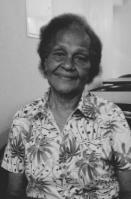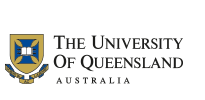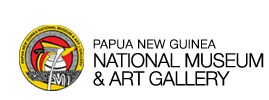Josephine Abaijah

Dame Josephine Abaijah was the first woman to be elected to the House of Assembly, in 1972. She pushed unsuccessfully for the territory of Papua not to be joined with New Guinea in the lead-up to independence. She discusses the Papuan experience of Australian administration and the separatist ambitions of the Papua Besena movement.
| Time | Summary | Keywords |
|---|---|---|
| 00:00:21 |
Josephine Abaijah is welcomed to the interview. |
|
| 00:01:05 |
Josephine Abaijah discusses her first encounters with Australians when she went to Australia when aged 15-16. She states that at Milne Bay she only had Papuan teachers, and sat for a scholarship examination. She recalls that her father was not happy about that but her mother encouraged her. She recalls that she joined a group who all went to schools in Charters Towers, Queensland. |
Australia, Charters Towers, education, Milne Bay, Queensland, school |
| 00:03:38 |
Josephine Abaijah states that while Australia made her who she is today she is not happy about what Australia did to the Papuan people. |
Australia, Papuan Independence |
| 00:06:20 |
Josephine Abaijah relates that she only knew Papuans. Having recently attended reunions from this time she questions why Australia only took some Papuans for education when they were going to prepare Papua for independence. |
Australia, Papuan Independence |
| 00:08:52 |
Josephine Abaijah discusses how she became involved in activism. She recalls her time at the Papuan Medical College and her contact with the Australian medical profession who taught her to stand up for herself as at that time the status of women in PNG was very low. She recalls that while at the Papuan Medical College she represented the country at the South Pacific Games held in Fiji in basketball. |
basketball, Papuan Medical College, South Pacific Games, sport, status of women |
| 00:10:11 |
Josephine Abaijah discusses sport in Papua, and learning basketball from the women in the village in Milne Bay. She recalls playing at school and for Papua Medical College against the Teachers College. She relates how at PMC she began working in rural areas of Central Province doing work in health education. |
basketball, Central Province, health education, Papuan Medical College, sport |
| 00:12:10 |
Josephine Abaijah recalls that it was through her health education work in rural areas where she would stay with people and see their difficulties and these people encouraged her to stand for politics. |
health education, political aspiration, rural areas |
| 00:14:10 |
Josephine Abaijah recalls her first exposure to independence ideas at PMC, and her switch to joining the PMC staff. She describes doing a health education course at London University in 1967-68, and on her return setting up the Institute of Health Education. |
health education, independence, London University, Papuan Medical College |
| 00:16:21 |
Josephine Abaijah explains that travelling with students made her realise the problems with decent roads, for example between Port Moresby and Hula, a distance that would have a decent road in Australia. |
development, Hula, infrastructure, roads |
| 00:18:15 |
Josephine Abaijah states that others shared her views at this time, especially regarding roads, light, water in rural areas. |
development, infrastructure, rural areas |
| 00:20:06 |
Josephine Abaijah states that she did not have contact at this time with others working for independence, but she recognised the needs of the people in rural areas who encouraged her to stand. She recalls that she thought she had no chance of being elected as a lot of women had stood but never been elected. She recalls that when she stood for Central Province she had no money for campaigning. |
Central Province, elections, independence, politics |
| 00:23:00 |
Josephine Abaijah states that she built her political platform around three principles - 'For Papua, for your land and for your health and well being', dictated by the people and by the pastors of the Uniting Church who were strong supporters. |
political campaign, Uniting church |
| 00:24:17 |
Josephine Abaijah discusses her campaigning, and the reaction of Australians counting the votes who made a declaration in other seats but did several recounts because they could not believe a woman had won the seat even though she had a big margin. |
elections, status of women |
| 00:25:57 |
Josephine Abaijah discusses her involvement with the Papua Besena movement and explains the meaning of the word she says was coined by Uniting Church missionaries and means family or community. |
Papua Besena movement, separatist |
| 00:31:23 |
Josephine Abaijah discusses the reaction of others in parliament to the Papua Besena movement, the lack of support from other Papuans in parliament because she was a woman and the research that Papuans have since conducted into their own history. She recalls making arrangments to visit Australia but no government minister would meet with her resulting in her use of demonstrations back in PNG. |
Australia, Charles Barnes, demonstrations, Papua Besena movement, status of women |
| 00:35:04 |
Josephine Abaijah discusses her reasons for visiting schools, providing a role model for children as a woman in parliament. She discusses her access to research on Papuan history. |
status of women |
| 00:40:34 |
Josephine Abaijah states that she had limited knowledge of other colonial experiences at the time, although she had travelled to Africa with the World Health Organisation, and reiterates that Australia made a mistake by pushing Papua and New Guinea together. |
Africa, World Health Organisation |
| 00:43:36 |
Josephine Abaijah discusses her experience as the first and only woman in the national assembly, how she was spat upon and had her hair pulled. She recalls not feeling welcome but gradually she established good relations with the men. |
status of women |
| 00:45:33 |
Josephine Abaijah discusses the need for infrastructure projects especially roads and her ongoing visits to rural areas. |
development, infrastructure, roads, rural areas |
| 00:50:27 |
Josephine Abaijah discusses her association with West Irian (now Indonesian Province of Papua), and approaches from Australian Aborigines and others for her support. |
Australian Aborigines, Indonesia |
| 00:52:53 |
Josephine Abaijah discusses the 1977 elections when she successfully stood for the National Capital District where a lot of Papuans were located, and the different challenges in that district. She recalls women storming the labour office to fight for an increase in wages. |
1977 elections, Albert Maori Kiki, demonstrations, Papua Besena movement |
| 00:58:09 |
Josephine Abaijah recalls the lack of political organisation in the early years and the travel by politicians. She describes her appointment as Governor of Milne Bay in 1999 for five years and states that she travelled extensively prior to entering politics. |
Milne Bay, travel |
| 01:01:05 |
Josephine Abaijah describes her support from the Rotary Clubs of Australia who helped her win election in Milne Bay and the need for politicians to achieve something practical for people. She gives an example Rotary sending hospital supplies to Milne Bay after the closure of an Australian hospital. |
Milne Bay, Rotary |
| 01:04:31 |
Josephine Abaijah discusses the issues of politicians travelling. |
travel |
| 01:06:18 |
Josephine Abaijah discusses her ongoing support from two prominent business people, Brian Bell and George Constantinou. |
Brian Bell, George Constantinou |
| 01:08:06 |
Josephine Abaijah discusses approaches for her to join a political party rather than be an independent. She discusses her ongoing projects including delivering sewing machines to women living in the Owen Stanley Ranges. |
Bill Skate, rural areas |
| 01:11:49 |
Josephine Abaijah discusses research into Papuan history and questions why Australia did not establish an upper house in PNG. |
|
| 01:18:19 |
Interview concludes. |
Biography

Josephine Abaijah
Dame Josephine Abaijah was born in Milne Bay Province, in 1944. She was the only girl in her primary school class when she began at the government school in her home village of Misima in 1950. She completed her secondary education in Charters Towers, Queensland, and in 1960 she was one of the first students at the Papuan School of Medicine in Port Moresby. She went on to complete a Diploma of Health Education in London and also studied in the Philippines, after which she returned to Port Moresby to work as a health administrator.
Abaijah was the first woman to be elected to the Papua New Guinea House of Assembly, in 1972, as the regional member for the Central District. She formed the Papua Besena movement in June 1973, with Papuan separatism as its key objective, and with others made a symbolic declaration of independence for Papua in March 1975. She was re-elected in the 1977 elections, this time as the regional member for the newly created National Capital District. She ran unsuccessfully for election in 1982 and in 1987.
Josephine Abaijah was made a Dame of the British Empire in 1990, and her autobiography, A Thousand Coloured Dreams, was published in 1991.
Dame Josephine returned to politics in 1997, when she was elected as Governor of Milne Bay Province. She left parliament in 2000.
Copyright © Papua New Guinea National Museum & Art Gallery,
The copyright holder of this material grants users permission to access the material on this website for the following purposes only: research and study, education, other non-commercial and non-public uses.




